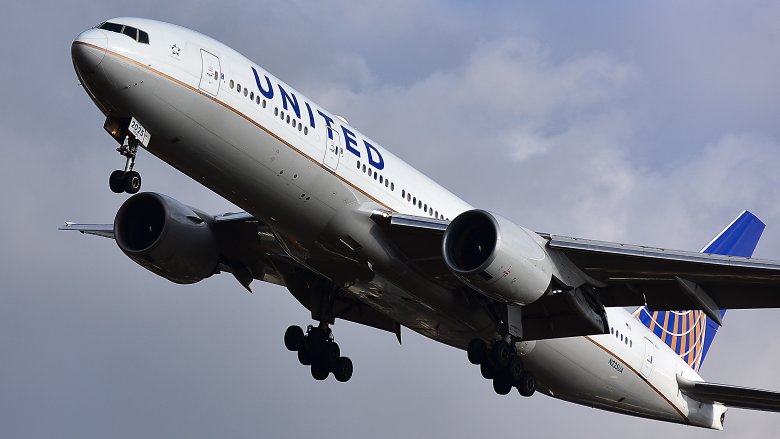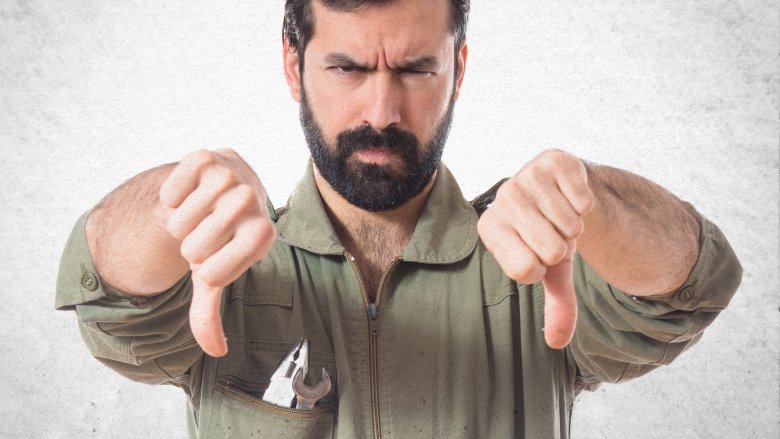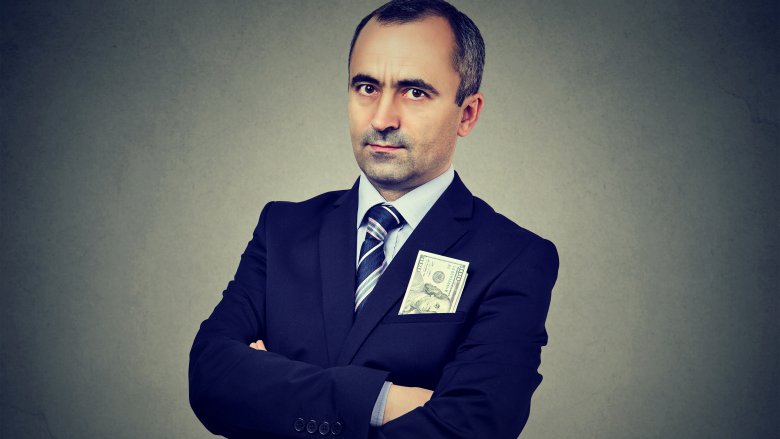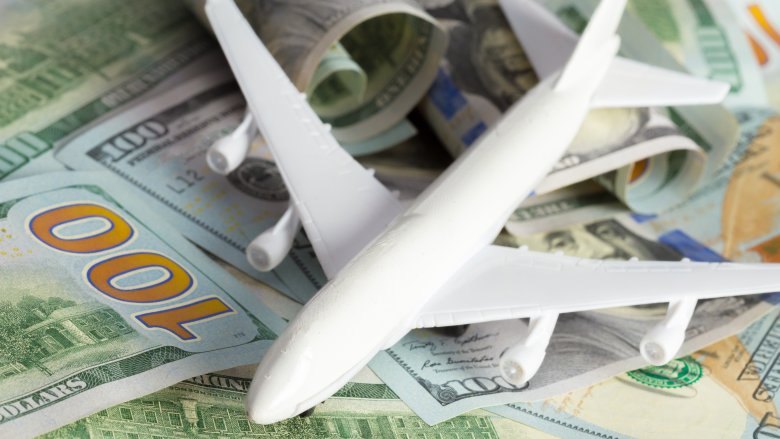The Sketchy Truth About United Airlines
During the early 1960s, United Airlines' biggest drawback was boringness. Since its inception in 1934, the company had cultivated clout, but a cold corporate image clouded its coolness. As one passenger put it (via University of Chicago Magazine), "United has a reputation for great dependability, reliability and soundness ... all the wonderful scientific advances known to the field of electronics and computers. However, they ain't got no sex appeal." Iconic adman Leo Burnett advised the company to add "friendliness, warmth and humanness and ... fun" to its ads.
The push to pull in customers birthed the slogan "Come fly the friendly skies of United." This inviting invention was soon coupled with alluring images of stewardesses in skimpy skirts. The friendly skies offered the hospitality of a homemaker and the coquettishness of a homewrecker. Decades later the homey airline wrecked its reputation with a series of scandals. Once a cutting-edge entity, United began to look like a cutthroat sky scoundrel that screws customers. Its dubious deeds and indubitable wrongdoings have done in its alluring aura. Here's a rundown of the runway pariah's shadiest shenanigans.
The Dao De Drag
In April 2017, United Airlines' reputation reached rock bottom faster than Dwayne Johnson's proctologist. Unless you live under a rock's bottom, you've heard the tale. Dr. David Dao hopped on a plane headed from Chicago to Louisville, Kentucky, and from there it was rough sailing. United decided that four of its employees should have seats on the already-filled aircraft and offered to pay patrons to play ball. The plot quickly thickened when Dao refused to abandon his plot of plane.
Unmoved by money, Dao got manhandled and bedraggled by cops called in to collar him. Footage of the kerfuffle featured the doctor bleeding, pleading, and ultimately ceding to authorities. The roughed-up and riled-up doctor sued, and an infuriated public pilloried the airline. Media outlets, however, offered an off-putting defense. CNN, for example, depicted the incident as an exasperating example of an accepted airline practice: "bumping" people from overfilled flights. But as Cornell Law School assistant dean Jens David Ohlin observed, that perspective and others like it overlooked how bumping functions.
Airlines can't jettison people from jets just to make space. Instead, they have to bump passengers before they board, according to Ohlin. Once Dao sat down on the plane, he plainly had dibs. In fact, United Airlines' own rules ruled out ousting the doctor unless he was being (unjustifiably) unruly. Perhaps that's why per NBC the company coughed up compensation like a tubercular lung in an undisclosed settlement.
Sowing seats of discord
In the aftermath of the Dao debacle, United highlighted 10 potential ways it could clean up its act. It listed common sense items like, "Stop forcing passengers already seated to give up their seats, except for safety or security reasons" and "Reduce the amount of overbooking." Of course, United should never have started forcing people out of seats, and as the LA Times noted, Dao's flight wasn't overbooked, just full.
Perhaps United was full of bull or just incredibly inattentive. Either way, its solutions failed to settle a second unsettling seating conflict that arose less than three months after the carrier sent a doctor to the hospital. As CBS elaborated, Shirley Yamauchi spent nearly $1,000 on her 2-year old son's plane seat. But a ticket-scanning mistake led airline workers to believe the child wasn't traveling with her. Guided by dollar signs, the staff sold the toddler's seat to a standby passenger.
Yamauchi had no clue until the standby passenger stood by her son's seat. Luckily, United's list of improvements included, "Empower employees to resolve customer service issues on the spot." Unluckily, the employee who resolved Yamauchi's issue just "shrugged" and walked away. Afraid of receiving a Dao-style beat-down, Yamauchi held her 25-pound toddler in her lap for their three-hour trip. USA Today observed that the Federal Aviation Administration deems it inherently hazardous to have a floppy unfastened child in a parent's arms. On the barely-bright side, it beats getting a beating.
Some dogs fly to heaven
Citing the U.S. Department of Transportation, CNN reported that in 2017 a total of 24 animals hind-kicked the bucket while traveling with an air carrier. Eighteen of them flew the friendly skies with United. That makes the airline seem like one sick puppy, but United spokesman Charlie Hobart blamed "the overwhelming majority of the incidents" on puppy sickness and animal unpreparedness. He claimed the animals couldn't acclimate to their crates or had an unknown "preexisting condition."
Perhaps some of those preexisting conditions were unknown because they didn't previously exist. Take Janet Sinclair's greyhound, Sedona, for instance. In 2013 Sedona traveled via United's PetSafe program, per NBC. The greyhound suffered a near-fatal heat stroke while trapped on a tarmac. To the airline's discredit, an employee did kick the canine's kennel into the shade. United claimed a "preexisting condition" caused Sedona's crippling complications, but a vet's assessment said otherwise. The company offered to cover Sedona's healthcare costs if Sinclair stayed silent. She didn't.
United regretted silence in 2018 when a canine cried and died on one of its flights. Per CBS, a mother and daughter flew with their French bulldog, Kokito. They struggled to fit Kokito's carrier under a seat, so a flight attendant crammed it in the overhead baggage bin. Perturbed by turbulence and a diminishing air supply, Kokito whimpered for two hours and then went quiet forever. United projects an amiable air, but it could be man's best friend's worst enemy.
Lost and hound
Not every United flight serves as a sky hearse for beloved pets. Instead of losing their lives, some simply get lost. According to CNN, within days of the death of Kokito the French bulldog, a German shepherd named Irgo ended up in Narita, Japan, instead of his scheduled destination, Kansas City, Kansas. When Irgo's family went to retrieve him, they found a Great Dane in his place, which wasn't great. In fact, it probably grated on everyone's nerves, including the animals'.
The dogs weren't just lost in transit, but in translation. As a German shepherd American, Irgo didn't speak Japanese, and the Great Dane presumably couldn't utter a lick of English. The pets had become furry Bill Murrays, marooned abroad and incapable of communicating. United was also at a loss for meaningful words. The airline explained that "an error occurred," which explained nothing. Thankfully, the animals fared well, so their families didn't have to say farewell.
United tried to assure customers it was taking steps to comprehend its missteps. However, comprehension couldn't come fast enough. Two days after its intercontinental confusion, United had to divert one of its planes after misplacing another pooch, according to North Jersey News. This time it was a domestic debacle, with an unidentified dog ending up on a flight to Missouri instead of Ohio. Then again, "Ohio" phonetically resembles a Japanese term for "good morning," so maybe the hound got lost in mistranslation.
The old man and the seething
When Oedipus solved the riddle of the Sphinx, it was a triumph for mama's boys everywhere. The moment also captured man's undulating aging process. At the dawn and dusk of life we don diapers, walk wobblingly, and have fragile bones. Since the elderly are basically wrinkly babies, it seems natural to handle them with kid gloves. Unfortunately, this didn't dawn on United customer service agent Alejandro Anastasia.
According to Click 2 Houston, in 2015 Anastasia disagreed with 71-year-old customer Ronald Tigner near the ticket counter. The tiff turned terrifying when the younger agent shoved the aged man to the floor. Tigner's noggin knocked against the ground, knocking him out. No one attempted to tend to him. Instead, a United worker dialed 911 and denied knowing how Tigner fell or whether he had fallen unconscious.
United fired Anastasia like a Romanov monarch. Authorities charged him with feloniously disrespecting his elders. Tigner took the agent and the airline to court in 2017, claiming the customer service rep taunted and attacked him for requesting a new boarding pass. Anastasia had a different take, accusing Tigner of swearing like a racist sailor, stepping on his toe, and possibly preparing to head-butt him. He countersued the passenger and chided United for improperly training employees. Whether Tigner was a head-butting butthead or a level-headed guy who got leveled, the incident reflected badly on United, and the lawsuits are still ongoing.
Personnel non grata
In fairness to United, a single shot of a single staffer hand-tackling a single septuagenarian doesn't mean all its employees are meanies. Assuredly, not all the company's customer service agents abuse the elderly. Some just abuse their power, like the ticked-off ticket counter agent in the above video.
The clip shows a showdown that went down in 2017. When flying from San Francisco to New Orleans, traveler Navang Oza forked over $125 for overly large luggage. On the return the fee inflated, even though his bag hadn't. The price jumped to a jarring $300, prompting Oza to approach the ticket counter agent to sort things out. Instead, things spun out of control.
Oza told NBC that "in trying to get an answer, the lady was being rude." Unwilling to give her a pass, the passenger whipped out his cellphone and began filming her. This angered the agent, who admonished Oza that he didn't have her "permission to videotape." When he persisted, she put the off-put Oza on her personal no-fly list. Like a peevish Caesar she commanded, "Cancel the reservation."
The agent complained that filming her was "unacceptable," which, ironically, is an unacceptable reason to cancel a flight. Aviation experts for NBC and Fox affiliate WOFL pointed out that people in public have no expectation of privacy. Despite her regal edict, the ticket counter countess had no grounds to keep Oza on the ground. It was another example of United's top-notch customer disservice.
Just plane wrong
Airlines excel at executing mediocre travel plans. Frequent flight delays cause malaise, contracting seats squeeze you like a uterus in labor, and subpar meals are par for the course. The one area air carriers have to care about is carrying people through the air. Erring in that area could cost lives and lucre, and you can bet your tail section that no airline would willingly risk such an outcome. Just know that if you made that wager, you would lose because United Airlines apparently took that chance roughly two dozen times.
Per CNN, in May 2017, the Federal Aviation Administration advocated fining United $435,000 for ferrying passengers on a plane "that was not in airworthy condition." The agency argued that back in 2014 United had its mechanics swap out a fuel pump on a Boeing 747. After overseeing the switch it committed an oversight. The plane should have been inspected for problems, but the airline let the aircraft take off 23 times for international flights without completing the check. United was evidently so pumped about its fuel pump that it may even have flown the Boeing twice after the FAA warned it not to.
United didn't exactly deny defying the FAA. But it did put a positive spin on the plane tale, writing, "We immediately took action after identifying the issue and are working closely with the FAA in their review." Depending on your definition of "immediately," that statement could completely confirm the FAA's complaint.
The right to fare harms
Airplanes use runways, but people associate them with highway robbery. It seems like every year passengers either have to take a price hike or hit the road. Naturally, that makes the air barons who run away with customers' cash seem eviler than Eden apples. But at their core they just want to make money, which is the root of all evil. Since you have to spend money to make money, companies like United Airlines invest their money in evil.
MassLive described a review of financial findings by the Center for Responsive Politics. The review revealed that throughout the 2000s and 2010s United conducted a campaign of political contributions aimed at boosting bucks and bucking boons for passengers. In 2015, for instance, it lobbied to block legislation that would have blocked airlines from taking the blockheaded step of placing pay toilets on planes. United has also opposed increasing penalties for "deceptive airline pricing advertisements," improving passenger rights, and prohibiting unreasonable fees.
United lobbyists have lobbed money at everyone from California Governator Arnold Schwarzenegger to email aficionado Hillary Clinton to airplane-loving Donald Trump. United convinced the executive branch to stem regulations on fee transparency and has even hindered laws that target human trafficking and airport security. Over a two-year period it spent over $7 million to defend itself from consumer protections. Considering the company's knack for knocking down passengers and knocking off pooches, it was probably a prudent move.
Execs' baggage
Fighting for the freedom to fleece fliers might sound like sheer sleaziness, but it makes sound financial sense. The more a company caters to customers, the less moolah it makes. Predictably, United fights tooth and nail to be as unaccommodating as legally possible. Well, except for that one time it used its nails to illegally scratch a bigwig's back.
In 2014 the head of New York and New Jersey's Port Authority got nailed for brazen bribery. As True New Jersey outlined, Chairman David Samson used his port authority to persuade United to create a nonstop flight between Newark, New Jersey, and Columbia, South Carolina. The airline lost an estimated $10,000 per week, according to an aviation expert interviewed by True New Jersey, but at least it shortened the commute to Samson's "polo-themed, multimillion-dollar" mansion in South Carolina from two hours to 30 minutes.
USA Today explained that currying favor with the chairman helped the carrier land a $25 million hangar lease and relocate a $10 million taxiway. Samson admitted to dangling these carrots and coercing United's compliance. Luckily for the airline, it also complied with law enforcement during a related criminal investigation.
United CEO Jeff Smisek resigned amid the scandal, but cooperating with cops saved his bacon from the big house. He then brought home the bacon in the form of an almost $37 million severance package, per the LA Times. Apparently abetting bribery scores you a huge payday.
Buy the friendly skies
The Fresh Prince of Bel-Air hilariously characterized money as "the universal lubricant" behind the music biz. Behind that funny phrasing is an unfunny truth about all business. Greased palms and greenbacks have the world in a vice grip, and corporations like United are oil-slick cash cows. Once they grow big enough, they can easily mooove past most muck-ups. As a result United continues to milk sour customers.
In a piece for Fordham University's Journal of Corporate and Financial Law, Andrew Rozo wrote that United Airlines is "too big to boycott." It shares a four-entity oligopoly with Delta, American, and Southwest. In loads of locations throughout the United States, United is the cheapest, fastest way to fly because it's more or less the only way to fly. So even if you don't buy the airline's pledges to repent or aren't sold on its soulless appeals to friendship, the company will still sell tickets, and most people will still buy them.
The key to keeping customers coming isn't to outdo the competition, but to remove competition like an intransigent traveler. In 2015, for instance, the airline owned 73 percent of take-off and landing authorizations, or "slots," at Newark Liberty International airport. Unsatisfied with its slot saturation, it tried to buy 24 more authorizations from Delta to up its control to 75 percent. The Justice Department deemed the deal unjust and successfully sued to stop it. The result: United maintained its stranglehold and business ensued as usual.



